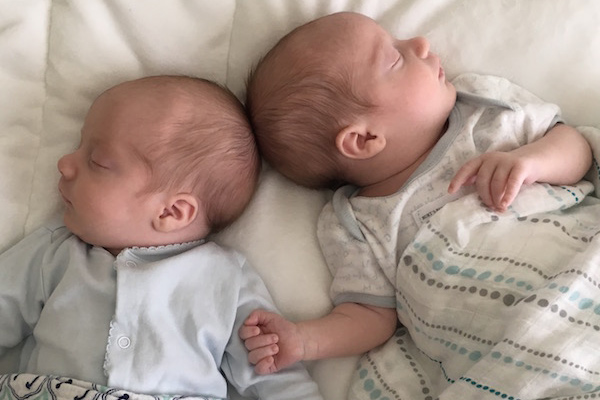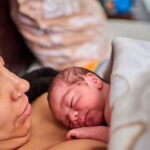Preterm Twin Emergency C-section

"Every morning after the Twin To Twin Transfusion Syndrome (TTTS) surgery, I prayed for 32 weeks to arrive. Each day that brought me closer felt like a victory, but I awoke night after night fearful I was in labor ... "
“We don’t need you NICU!” I repeated for weeks every time Brian and I passed the neonatal intensive care unit (NICU) at UCLA on our way to be checked for pre-term labor. “My babies will be fine! … Besides, we are almost in the green zone,” I declared.
Thirty-two was the most important number I had ever known since the day of our emergency fetal surgery at 24 weeks’ gestation. “You will be in the green zone if you make it to 32 weeks of pregnancy,” we heard from our fetal surgeon. “The red zone is 24 to 28 weeks where children born have major hurdles to overcome and are often born with disabilities. The yellow zone is 28-32 weeks where kids can have breathing issues and other problems, and the green zone is 32 weeks on. Let’s hope you make it to 32 weeks.”
Every morning after the Twin To Twin Transfusion Syndrome (TTTS) surgery, I prayed for 32 weeks to arrive. Each day that brought me closer felt like a victory. I awoke night after night fearful I was in labor. To say it was a harrowing time is an understatement.
[Editor’s note: According to the American College of Obstetricians and Gynecology (ACOG) TTTS is a very rare and serious condition that affects monochrorionic twins (identical twins who share one placenta) causing an unequal flow of blood between the two babies. While one twin receives too much blood, putting strain on the cardiovascular system, the other baby does not receive enough, and often struggles to grow properly while in the womb. While any surgery in pregnancy is risky, this procedure is crucial for the survival of the twin babies. Pregnant women with this type of condition are closely monitored and often advised by their health care provider to have a cesarean delivery.]
Making it to 32 Weeks!
The morning I woke up 32 weeks pregnant in my third trimester, tears streamed down my face as light poured in my window. I breathed the biggest sigh of relief imaginable. We went to our weekly ultrasound appointment and heard the good news that the babies were up to 5 pounds each (really large for twins at 32 weeks). Baby A (Theo) had been breech for weeks and was still not moving from his position, but we thought he would turn closer to delivery. My OB was convinced we had a few more weeks to go and that we would be delivering some of the biggest twins imaginable. More sighs of relief.
I finally ventured out of the house to church with Brian that Sunday for the first time since my surgery. I was quickly becoming more and more uncomfortable sitting, sleeping and combating acid reflux each day. I remember the Lord saying, “This is the last Sunday you will be in church before the boys are born” as we worshipped that day. I decided that meant we weren’t going to church for at least another month. After all, it was the Fourth of July, and their original due date was August 24th. We had some time.
That Tuesday, Brian was providentially working from home, and I was getting ready to head to my weekly ultrasound when the first signs of labor began. I ran into our office to grab Brian and off we rushed to UCLA. I knew that 32 weeks was the “safe zone,” but I also knew the babies needed to stay in as long as possible.
At UCLA, we discovered I was in the very beginning stages of labor, but it still looked like it would be several weeks before delivery. I received a steroid shot to speed up the babies’ lung development in case they arrived early. I was asked to return within 24 hours for the second steroid shot. Brian and I went home and I tried to relax, but I still felt off. That evening after some cramping my water broke, and we rushed back to the hospital.
Once there we found that Baby A’s (Theo) water had broken, but Baby B’s (Henry) was still intact. Amniotic fluid continues to replenish even after the sac breaks (yes, the human body is amazing!), so the decision was made to park me in the hospital as long as I could manage until I started to dilate. I felt relieved knowing I had made it to the beginning of the end after such a long, tiring journey.
I started multiple IV drips, took the second steroid shot and settled in for what I thought would be several weeks. Thankfully, my parents were already on a flight as we thought birth was imminent the day before. After a long day in the hospital, Brian and I tried to sleep that evening. I was weak and tired, but resolved to hold on a few more weeks.
In the middle of the night, a doctor arrived from the NICU to walk us through the admitting procedures once the babies were born. I tuned her out as I denied the inevitable, unable to comprehend my babies undergoing a hospital stay. I believe she informed us about many of the difficulties that could and would lie ahead, but I turned a deaf ear.
In the midst of another sleepless night, the contractions started to get closer together. I gritted my teeth and put on a smile each time a nurse came to check on me. “I am feeling just fine; no worries here!” I would utter each time my contraction monitor spiked. “Just hold on a few more weeks,” I told myself.
Bringing the Babies Earthside
At 7 a.m. on Friday, July 8, 2016, my OB/GYN arrived in my hospital room to check in. After a quick check of my cervix, I will never forget her words: “You ready to have some babies today?”
Brian asked the doctor if we could wait until 10:30 a.m. for the surgery, so all our family had time to arrive. All he had to do was look at my doctor’s face to know that was a big no. We immediately began prepping for an emergency C-section. My body shook as I readied myself for another grueling day and prayed for strong lungs and strong hearts for the babies. (After our fetal surgery, we had two mandatory, in-depth echocardiograms that revealed the babies could be born with potential heart issues requiring surgery, but it was impossible to tell until birth. I also knew many preemies were born with weak lungs.)
My parents arrived minutes later, just in time to kiss me goodbye as Brian and I walked in the operating room. I was glad Brian was with me—my constant supporter, my biggest encourager. We were hand in hand, joined together as the C-section began.
The team at UCLA could not have been better. I barely felt my spinal tap; my doctor narrated the process for me. I had the best nurses possible tending to my every need—including lavender scented towels and my own Pandora station—I was truly in amazing hands.
I will never forget hearing Theo and Henry for the first time. I couldn’t see anything because of the drape over my stomach. I waited and waited to hear their cries. They were a distance away from me, but when I heard their screams, my heart leapt with joy! I asked Brian over and over how they looked and if they were OK, and he assured me they looked strong and healthy. Theo was born at 5 pounds, 1 ounce, and Henry came in at 4 pounds, 14 ounces. Small but mighty little men.
The second both babies were born, they were whisked away to the NICU by a team of nurses and doctors. I didn’t have the chance to hold my babies that day. I first touched them laid out on a hospital bed as I reached my hand through their incubators. I’d read books and went to classes that discussed how important it is to hold your baby and nurse after birth, but that was simply not my story. I suppose I could’ve been upset about missing out, but I was so elated they were alive that I didn’t even think about it.
I spent the rest of the day dozing in and out of consciousness as my nursing team woke me for medications and tests. I was beyond tired and could feel intense pain rearing its ugly head every time I woke up. I developed postdelivery preeclampsia, so my blood pressure skyrocketed. I started a series of breathing treatments and rounds of heavy medication.
As I recovered, I heard the sounds of crying babies in other recovery rooms with their parents. My heart and my arms yearned for my babies, but I rested knowing they were in the best care possible. Brian went back and forth to the NICU and brought reports. Doctors and nurses informed us about the babies’ progress throughout the night. Theo had been born with a collapsed lung, and he required immediate surgery. My eyes grew large as I asked Brian again and again if the boys were OK. “Yes, honey, they are fine,” he kept repeating to me. This was the first of many times I would hear that things like collapsed lungs are normal medical conditions for premature babies—and not a huge cause for concern. How that sinks into a new mother’s head and makes her not worry is beyond me.
“Henry will probably only be here a few days and Theo maybe a week,” I heard that day. Well, I thought, I guess I can handle them being in the NICU until we head home in a few days. They’re just fine.
In For the (NICU) Long Haul
I woke the morning after they were born and made the “first walk” after surgery. The pain (even while hopped up on strong pain meds) was incomprehensible. Lifting myself out of bed and walking to the bathroom felt like a million knives stabbing all over my stomach and pelvic area, coupled with the feeling all my insides falling out.
My attending nurse, or Angie the angel, helped me out of bed that day. I remember telling her I couldn’t get up because I was in too much pain, and she smiled patiently but firmly as she told me I had no choice. I had to get up. I remember recognizing right then that this journey called motherhood would be full of moments like this—where I would have no choice but to gather my strength and get up.
When I arrived at the NICU, I first had to make it past the front desk, which only allowed parents with ID bracelets or their guests to enter. I immediately removed all my jewelry and scrubbed in before I was allowed to walk back to the boys’ “pod.” As I entered, I took in the NICU for the first time—the smells, the sounds, the sights. It was overwhelming. There were 22 beds for babies, with four to a “pod.” At all times, there are surgeries being performed on the babies at their bedside, nurses running to and fro, crying families, laughing families, families taking their babies home, teams bringing new babies in, screaming babies, wailing babies and silent babies. There was the sound of medical equipment—warming bassinets, beeping monitors, wires, IVs, medications, washing stations, and pump stations for all the mothers who could not directly feed their newborns (like me).
As we walked by the front bank of desks that held the receptionists, some nurses, and the attending physician, I was struck that everyone knew who we were. We were famous! I was Theodore and Henry’s mom—the new twins in Pod 3. Everyone smiled and asked me how I was doing every single time I made that walk. I remember looking in the mirror down that corridor thinking, I’m a mother? To two babies? How did this happen? And I’m supposed to be strong enough to endure a stay in intensive care? Will they live? Those were the constant questions on my mind.
I remember standing at the front of the boys’ pod, not knowing what baby to go to first. From that first moment, my heart was divided. It was equal, but it was in two parts. That is one of the crazy things about being a twin mom. Loving two at once, both for the first time.
I went to Henry, my second-born first, as Brian was with Theo across the pod. The first thing I noticed was that he was covered in wires, and his monitors constantly beeped. My eyes were drawn to the tiny IVs stabbed into his precious, little hands, with the tiniest pools of blood around them. As I lowered myself into the chair next to his incubator, his nurse Renee changed him, wrapped him in a blanket, pulled all of his wires together in a way only a professional could, and laid my son on my bare chest. Henry was so light—under 5 pounds. I remember holding him and feeling more joy exploding from my heart than I ever knew possible. I spent a good long time there, cuddling with him. He couldn’t feed as he was born with a weak suck reflex and was fed through a tube in his nose. Before I moved over to hold Theo for the first time, I remember wanting to rip off all of the IVs and wires, put him over my shoulder and take him out of the NICU forever. That feeling would be constant in the days and weeks ahead.
About an hour later, I shuffled over to Theo’s bed to hold my first-born. I will also never forget that feeling—the overwhelming joy of holding him for the first time. By the time I had cuddled with both, I was utterly exhausted and my medication was wearing off. I returned to my hospital room in a wheelchair, already yearning to be reunited with my tiny fighters. We left the hospital three days after I gave birth. I felt devastated leaving without either one of my babies and cried almost the whole way home.
The next few weeks were some of the most challenging of my life. Every trip to the NICU felt like a battle as I girded my mama’s heart for our daily trek to the boys’ pod. While the NICU was a place of happiness, it was also a place of great sadness. Every day we got more reports with their progress or lack thereof. It seemed like they would take two steps forward followed by one step back.
As I recovered from home, I woke every few hours to pump milk to take to the NICU for the babies because they still could not nurse due to their prematurity. I watched every day as mothers just like me went into the NICU, hobbled over (as many had had C-sections) to their babies’ bedside and hooked up to a pump for their children. We were all pumping warriors together, fighting to give our little loves the best fighting chance.
The babies didn’t have any more surgeries, but they were constantly off and on oxygen and learning to feed properly. We joined the NICU support group and met other families in our situation, and we bonded with them. We got to know the sweet Chaplain and would pray with her often. We became like family with our NICU nurses, in particular one woman we now affectionately call Auntie Bessie.
I learned a completely new language with words like “Bradys” (for a Brady “episode” where breathing ceases), “D-sats” (for desaturation of oxygen) and “Apnea” (more prolonged breathing cessation). All three issues were “normal” for premature babies, who are typically born with underdeveloped lungs. I learned that the babies would not be discharged until they went at least five days without “As, Bs, or Ds.” They also had to take every feeding from a bottle—which at the beginning seemed almost impossible as they were exclusively fed through tubes.
Finally Homeward Bound
Almost three weeks to the day after the babies were born, that glorious day of all days arrived: The day we were cleared to go home! My heart soared at Henry’s consistent positive reports. Theo followed close behind. I prayed desperately for a double discharge and a lenient attending physician that might overlook Theo’s continued need for oxygen and just let him come home with us.
I had a vision of our exit from the hospital: I saw our twins perfectly healthy, leaving the hospital with their double stroller and their two car seats, amidst balloons, gifts and loud cheering down the NICU hallway. What was NOT my vision was doing this whole song and dance with one half of that equation.
“You know one of your twins is going to go home way before your other twin, right?” said the attending physician to me the day before Henry was set to discharge. I gulped and nodded as I started considering a new reality. I felt nauseated and sick at the thought of separating my boys and our family.
The day we arrived to take Henry home, Brian’s parents arrived to stay behind with Theo as we made a break for the free world. I kept it together until we placed Henry in the stroller and I looked back at Theo hooked up to all his monitors and oxygen. I absolutely lost it. The walk out of the NICU, with Henry in one half of the stroller, placing him in only one of the two car seat bases in the car, was both exuberant and horrifying.
That first night home, as I held Henry and thought of Theo, I felt God’s word wash over and heal my fears again. God spoke to me about all the incredible things He had in store for Henry, that Henry was special both individually and as a twin (as was Theo). It gave me a very different perspective on twins, and a reminder that I needed to love them both individually and corporately. That time also allowed Brian and I to adjust to having one baby at home, while we waited with hopeful anticipation that Theo would join us soon.
One week later, we got the call we had dreamed of for a month: it was Mr. Theo’s turn to come home! We arrived at the NICU, giddy and delighted. As we pushed Theo out of the doors that had been so hard to walk in, we erupted with shouts of praise and tears of joy—the long, strange, difficult, crazy journey was over! That will always be one of the best moments of my life, and our lives together.







